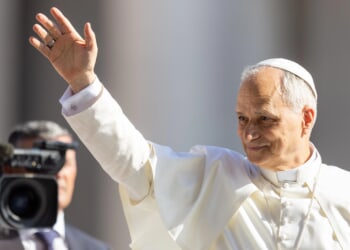It appears President Donald Trump’s long-standing pledge to repeal the so-called Johnson Amendment, a law prohibiting churches and nonprofits from endorsing political candidates, is finally coming to fruition.
The Internal Revenue Service (IRS) said in a recent court filing churches are permitted to endorse candidates from the pulpit and that such actions won’t endanger their 501(c)(3) nonprofit status.
Listen to the latest episode of “Quick Start” 👇
The longtime understanding of U.S. tax code — under the so-called Johnson Amendment — was nonprofits and churches couldn’t endorse or oppose candidates, CNBC reported. But this new guidance would presumably change that dynamic.
“Communications from a house of worship to its congregation in connection with religious services through its usual channels of communication on matters of faith do not run afoul of the Johnson Amendment as properly interpreted,” the IRS proclaimed in a joint court filing with the National Religious Broadcasters (NRB), a coalition of Christian media organizations.
The document continued, “When a house of worship in good faith speaks to its congregation, through its customary channels of communication on matters of faith in connection with religious services, concerning electoral politics viewed through the lens of religious faith, it neither ‘participate[s]’ nor ‘intervene[s]’ in a ‘political campaign,’ within the ordinary meaning of those words.”
These proclamations were made in documentation presented before the U.S. District Court for the Eastern District of Texas as part of a settlement between the IRS and two churches and NRB, which joined forces to claim the Johnson Amendment is an impediment to First Amendment freedom.
The settlement reportedly hasn’t yet been approved.
As CBN News previously reported, the Johnson Amendment was adopted by Congress back in 1954. Some say the measure, named after then-Texas Democrat Sen. Lyndon Johnson, was actually aimed at silencing his political critics.
Others, though, have said the measure rightly stops nonprofits and churches, which are tax-exempt, from trying to sway people in elections.
Claims the Johnson Amendment restricts free speech aren’t new. In fact, the Republican Party’s 2016 platform addressed the issue and called for its repeal.
“We support repeal of the Johnson Amendment, which restricts First Amendment freedoms of all nonprofit organizations by prohibiting political speech,” it read.
Despite the IRS’s recent court filing, the following guidance, as of the publication of this article, is present on the IRS website surrounding churches and political activity:
In 1954, Congress approved an amendment by then-Sen. Lyndon Johnson to prohibit 501(c)(3) organizations, which includes charities and churches, from engaging in any political campaign activity. To the extent Congress has revisited the ban over the years, it has, in fact, strengthened the ban. The most recent change came in 1987, when Congress amended the language to clarify the prohibition also applies to statements opposing candidates.
Currently, the law prohibits political campaign activity by charities and churches by defining a 501(c)(3) organization as one “which does not participate in, or intervene in (including the publishing or distributing of statements), any political campaign on behalf of (or in opposition to) any candidate for public office.”
The history surrounding the Johnson Amendment’s origins is fascinating.
One of the major critiques of the measure is that Johnson’s push for it was purportedly centered on silencing secular organizations that had opposed his Senate run.
Former Purdue University sociology professor James D. Davidson once wrote that Johnson faced accusations of being soft on communism, which led to pushback against him as a candidate.
“Johnson was not trying to address any constitutional issue related to separation of church and state; and he did not offer the amendment because of anything that churches had done,” Davidson wrote. “Churches … were banned because they have the same tax-exempt status as Facts Forum and the Committee for Constitutional Government, the right-wing organizations that Johnson was really after.”
Churches themselves have engaged in attempts to test the Johnson Amendment, with events like “Pulpit Freedom Sunday” encouraging preachers to share about politics and candidates from the pulpit.
The IRS, however, has rarely enforced the Johnson Amendment or gone after these houses of worship in any substantial way. The only known example of a church losing its tax-exempt status under the Johnson Amendment was Branch Ministries in New York, which ran a 1992 ad against electing then-Arkansas Gov. Bill Clinton. Ultimately, the IRS won in court, too.
“Christian Beware,” the ad read, in part. “Do not put the economy ahead of the Ten Commandments.”
Ultimately, the Johnson Amendment does have its supporters, even in religious circles. In 2017, a coalition of 99 religious groups sent a letter to Congress urging politicians to push back against Trump’s repeated pledge to overturn the law; most of the signatories are liberal, The Christian Post reported at the time.
“We, the 99 undersigned religious and denominational organizations strongly oppose any effort to weaken or eliminate protections that prohibit 501(c)(3) organizations, including houses of worship, from endorsing or opposing political candidates,” the letter opened. “Current law serves as a valuable safeguard for the integrity of our charitable sector and campaign finance system.”
The letter explained that religious leaders are free to endorse candidates on their own so long as they do not do so through houses of worship, and affirmed that pastors and other religious leaders can also address “moral and political issues of the day” from their pulpits. That said, IRS law forbids churches from endorsing or opposing candidates, as they are tax-exempt organizations.
“Current law simply limits groups from being both a tax-exempt ministry and a partisan political entity,” the letter affirmed.
The signatories went on to say that they opposed any efforts to weaken the Johnson Amendment, explaining that the public doesn’t want churches to turn into places where partisan political fighting reigns. And, based on polling, the letter might be correct.
A 2017 Lifeway Research poll found that 79 percent of Americans oppose preachers endorsing candidates from the pulpit. That said, more than half of respondents — 52 percent — disagreed with stripping churches of tax-exempt status if they did choose to endorse.
As for the IRS’s latest move, it appears to allow more open political discussion, although Politico reported that it doesn’t “appear to clear the way for religious organizations to spend money on more broad-based political activities like advertising campaigns.”
NPR added that a religious group’s endorsement of a candidate is now seen by the IRS as similar to a “family discussion,” particularly when it is communicated to members and parishioners.
Only time will tell what this looks like in practice. CBN News will continue to cover the story as it unfolds.
As the number of voices facing big-tech censorship continues to grow, please sign up for Faithwire’s daily newsletter and download the CBN News app, developed by our parent company, to stay up-to-date with the latest news from a distinctly Christian perspective.















